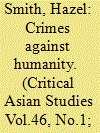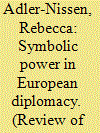| Srl | Item |
| 1 |
ID:
127769


|
|
|
|
|
| Publication |
2014.
|
| Summary/Abstract |
The United Nations Human Rights Council (UNHRC) Commission of Inquiry, established in 2013 to investigate human rights violations in North Korea, identified food rights violations, among other abuses, as potentially constituting crimes against humanity. A contradiction arises in that UNHRC claims of food rights violations in the DPRK are not congruent with the statistical indicators emanating from the UN humanitarian and development agencies that have worked in the DPRK since the mid 1990s and that have engaged in and published substantial research on food, nutrition, and health. The author of this article contends that North Korea has an oppressive government and argues that the lack of transparency makes the many things that are unknown about North Korea, especially its opaque penal system, of legitimate ethical and political concern. Reasonably good data on issues pertaining to social and economic rights do exist, however, as this article shows. The inconsistency between the received wisdom on food and nutrition is of concern because the potential consequences of a state being judged as committing crimes against humanity include military intervention and consequent threats to life for millions. This article reconsiders how and why the received wisdom becomes unchallenged and unchallengeable in scholarly, policy, and media discourse. Inconsistency and misrepresentation is not primarily due to conscious bias but much more because of the unconscious adoption of a securitized perspective through which knowledge about North Korea is filtered. The article argues for reframing North Korean human rights issues on the basis that North Korean society is neither unique nor unknowable.
|
|
|
|
|
|
|
|
|
|
|
|
|
|
|
|
| 2 |
ID:
029690


|
|
|
|
|
| Publication |
London, Longman Group Limited, 1970.
|
| Description |
xv, 427p.: ill.hbk
|
| Standard Number |
0582108063
|
|
|
|
|
|
|
|
|
|
|
|
Copies: C:1/I:0,R:0,Q:0
Circulation
| Accession# | Call# | Current Location | Status | Policy | Location |
| 012516 | 951.03/HIB 012516 | Main | On Shelf | General | |
|
|
|
|
| 3 |
ID:
141052


|
|
|
|
|
| Summary/Abstract |
National diplomacy is challenged by the rise of non-state actors from transnational companies to non-governmental organisations. In trying to explain these challenges, scholars tend to either focus on a specific new actor or argue that states will remain the dominant diplomatic players. This article develops an alternative Bourdieu-inspired framework addressing symbolic power. It conceptualises diplomacy in terms of a social field with agents (field incumbents and newcomers alike) who co-construct and reproduce the field by struggling for dominant positions. The framework is applied to the EU's new diplomatic service (the European External Action Service, EEAS), which is one of the most important foreign policy inventions in Europe to date. I show that the EEAS does not challenge national diplomacy in a material sense – but at a symbolic level. The EEAS questions the state's meta-capital, that is, its monopoly of symbolic power and this explains the counter-strategies adopted by national foreign services. The struggles to define the ‘genuine’ diplomat reveal a rupture in the European diplomatic field, pointing towards a transformation of European statehood and the emergence of a hybrid form of diplomacy. A focus on symbolic power opens up new avenues for the study of transformations of authority in world politics.
|
|
|
|
|
|
|
|
|
|
|
|
|
|
|
|